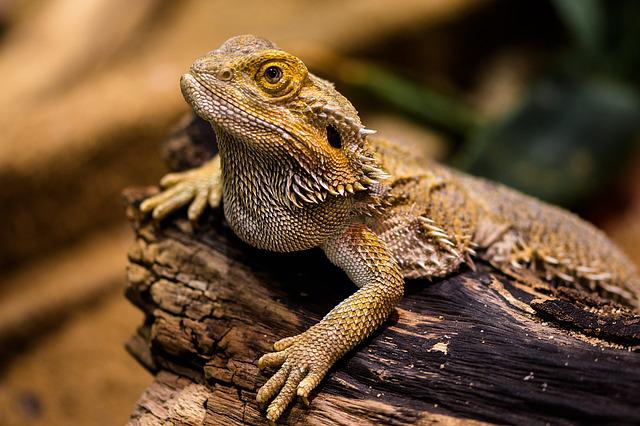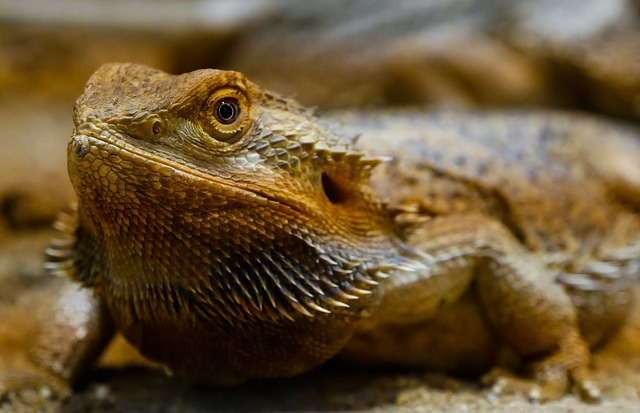Why is my bearded dragon hiding? There can be a lot of different reasons why your bearded dragon might be hiding, and in this blog post we will discuss some of the most common ones. If you are having trouble getting your bearded dragon to come out from hiding, then read on for some tips!
Why Is My Bearded Dragon Hiding?

Bearded dragons are incredibly fascinating creatures. They are native to Australia and live in the wild for an average of 8-10 years. In captivity, however, they can live up to 20 years with proper care. These lizards grow to be about 2 feet long and are omnivores, meaning they consume both plants and animals. Their diet consists of fruits, vegetables, insects, and small mammals. In their natural habitat, bearded dragons will bask in the sun to regulate their body temperature. At night, they will burrow into the sand to stay warm. Paying close attention to your bearded dragon’s behavior is crucial in providing them with the best possible care. Why my bearded dragon hides may have several different answers, so observing their behavior closely is the best way to ensure their happiness and health.
Reasons Why Bearded Dragons Hide?
Beardies are social creatures that enjoy basking in the sun and interacting with their owners. However, there may be times when your bearded dragon wants to hide away. While this bearded dragon behavior is perfectly normal, it can be worrisome for a bearded dragon owner. If you’ve noticed that your bearded dragon has been hiding a lot lately, there could be several reasons why. It could be that they’re feeling stressed or ill, they’re molting, or they’re simply trying to stay warm. Let’s take a closer look at each of these possibilities.
There are a few different reasons for your beardie hiding, including:
- Stress: Like humans, bearded dragons can experience stress. If something in their environment has changed (e.g., a new pet has been introduced to the home), they may seek out a place to hide until they feel comfortable again.
- Illness: If your bearded dragon is hiding constantly and seems lethargic, it could be a sign of illness. Be sure to take them to the vet for a check-up if you’re concerned about their health.
- Shedding: Bearded dragons shed their skin periodically as they grow. During this time, many bearded dragons may want to hide away from everyone while they undergo this natural process.
- Lack of Appetite: If your bearded dragon isn’t eating, it may be trying to tell you something is wrong. It could be sick or feel stressed, and is therefore seeking a place to hide and feel safe.
- Molting: Molting is another common reason why bearded dragons hide. This is when they shed their skin and grow new scales. It can be a stressful time for them, so they may look for a place to feel safe.
- Fear: Fear is a natural emotion that all animals experience. It’s an instinctual response to perceived danger and is part of the fight-or-flight response. In the wild, fear helps animals to survive by warning them of predators or other dangers. However, fear can also be triggered by less threatening stimuli, such as loud noises or sudden movements. For pets, fear can be a more complicated emotion. Some animals may be afraid of certain people or other animals, while others may be afraid of being left alone or being in new environments. Fear can also be caused by traumatic experiences, such as being abused or neglected. Understanding the causes of fear in pets can help owners to provide the support and care that their animals need. If your bearded dragon is hiding, it could be because they feel threatened and this is normal behavior.
- Strange Environment: If you have a new baby bearded dragon that you have just brought home then it’s natural for them to hide often until they become used to their new surroundings. Your pet bearded dragon may also hide if you have multiple bearded dragons in an enclosure.
Overall, there are a variety of reasons why bearded dragons hide. In most cases, this behavior is perfectly normal and nothing to worry about. Other bearded dragons display natural behaviors like head bobbing and creating basking spots.
Is My Bearded Dragon Cage A Reason Why He Is Hiding?

There are a few reasons why your bearded dragon may be hiding. One possibility is that the cage is too warm. Bearded dragons are cold-blooded, so they rely on their environment to regulate their body temperature. If the cage is too warm, your bearded dragon may be trying to escape the heat by hiding in a cool, dark place. Another possibility is that the cage is too bright. Bright white light can be overwhelming for bearded dragons, so they may seek refuge in a darker area. Finally, your bearded dragon may simply be feeling insecure or stressed. If you’ve recently added new furniture or décor to the cage, your bearded dragon may be hiding because it feels unsafe or exposed. If you’re not sure why your bearded dragon is hiding, try moving it to a different location in the cage or providing more hiding places. Ultimately, giving your bearded dragon a safe and comfortable environment will help reduce stress and encourage it to come out of hiding in a few days.
Do Other Bearded Dragons hide?
Most bearded dragons will want to hide at some point or another. Therefore, it is suggested when getting a baby bearded dragon to provide a hide box. In the wild, other bearded dragons bask in the sun to regulate their body temperature. In captivity, they rely on their owners to provide them with the right type of light. Most beardies require a basking spot that offers bright white light with a UVB index of 10%. This can be provided by special fluorescent bulbs or mercury vapor bulbs. Bearded dragons also need access to unfiltered natural sunlight for a few hours each week. Providing the right type of light is important for bearded dragons, as it helps them to generate vitamin D3, which is necessary for calcium absorption. Without enough vitamin D3, beardies can develop a condition known as metabolic bone disease. The metabolic bone disease weakens the bones and makes them susceptible to fractures. By providing your beardie with enough UVB light, you can help to keep him healthy and prevent this debilitating condition.
Conclusion
If Bearded dragons are naturally shy creatures, too much stimulation can lead them to seek out a quiet spot to hide. If you think your pet may be sick, it’s always best to consult with a veterinarian. However, if your adult bearded dragon appears healthy and is simply hiding more than usual, try providing it with more hiding spots or a safe, warm place in its enclosure. This will give your bearded dragon a sense of security and may help reduce its stress levels.

